Itchy Skin After Shower: Causes, Prevention, And Expert Tips
Simple ingredients from your pantry to soothe the skin after stepping out of the bathroom
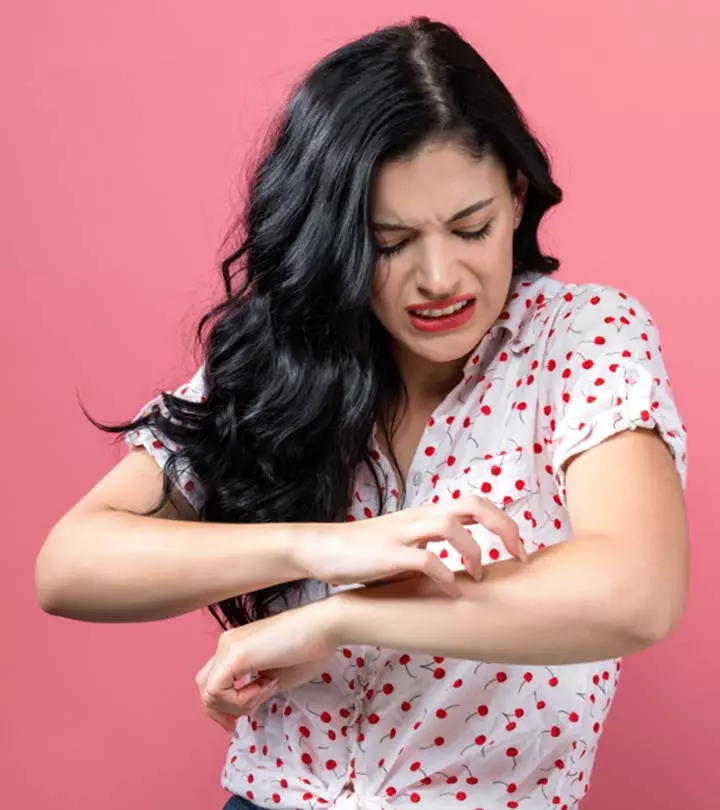
Image: Shutterstock
Itchy skin after a shower is pretty common, especially after a warm shower. Ever wondered why it happens? It is because the water can strip the natural oils from your skin. However, there are several other possible reasons behind it. Read this article to discover the causes of itching after a shower, ways to manage it, and prevention tips. Scroll down.
In This Article
What Is Itching?
Itching is a sensation that occurs when certain things touch your skin.
It triggers you to move your hands to the area and scratch it. While this seems to be a very basic and spontaneous reaction, it is actually your body’s way of protecting you from insects and other foreign bodies.
Not everything that touches your skin requires you to itch it away. For instance, your clothes are in constant contact with your skin, and you don’t feel the need to itch. This is because your brain does not perceive clothes to be a threat to your skin. A special group of cells called inhibitory spinal neurons helps in differentiating what is and what is not a threat. These neurons transmit signals between your brain and skin and help to determine what is a potential threat (1).
 Trivia
TriviaNow that you know the science behind the simple itch, let us look at why do you feel itchy after shower and what are some of the potential causes?
Key Takeaways
- From skin dehydration to harsh chemicals in soap, there are many causes of itchy skin after a shower.
- Moisturizing your skin, using essential oils in the bath, or taking cold showers can help manage the itch.
- Applying menthol or apple cider vinegar are a couple of home remedies for relieving itching.
What Causes Itchy Skin After Showering Or Bathing?
Feeling Itchy after shower can be caused by something as benign as loss of moisture after a shower or it could be a sign of something much more serious. Let us find out further.
- Dry Skin

Studies show that soap strips the skin of its essential oils and has a disruptive effect on the barrier function of the skin. Artificial fragrances and preservatives in soaps can be harsh on the skin, making it feel tight, dry, or flaky. They can also irritate sensitive skin and weaken the skin’s moisture retention capability. Soaps also tend to have sodium lauryl sulphate (SLS) which is known to be a potential skin irritant and may cause dermatitisi Common skin inflammation and irritation that makes skin itchy and dry and causes rashes, blisters, and discoloration. . The same study also showed that using soap to wash the skin and using a towel to dry yourself may further increase the dryness of your skin (2).
- Xerosis
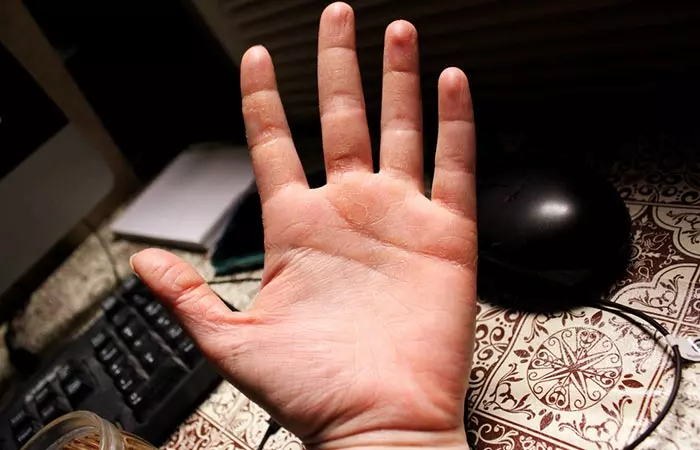
Long hot showers or baths during the winter may cause Xerosis, making the skin dry and itchy. It is a condition that decreases the sebum levels in the skin. Sebum is an oily substance produced by the sebaceous glands that keep the skin moisturized. In some cases, xerosis can also cause painful cracks on the skin (3), (4). Factors like eczema, allergic reactions, and hives may also cause xerosis (4).
- Aquagenic Pruritus
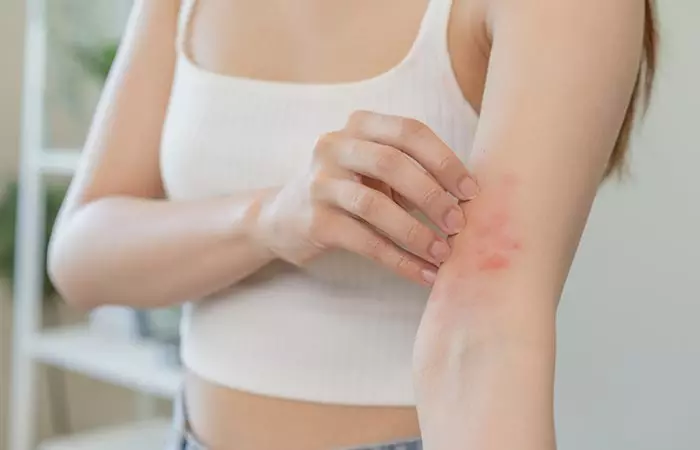
This is a very rare skin condition that causes intense itching when your skin comes in contact with water. The itching can begin immediately and can last for up to an hour or more. Legs, arms, chest, back, and abdomen are the most commonly affected areas (5).
Aquagenic Pruritus, according to this study, can also be an underlying symptom of bone marrow diseases (Myeloproliferative Neoplasm) that can affect our platelets and red or white blood cells. Out of 504 patients of MNP, 54.4% had essential thrombocythemia (high platelet count), 37.7% had polycythemia vera (high red blood cell count), and 7.9% had primary myelofibrosis (build-up of scar tissue in the marrow affecting blood cell production).
 Trivia
TriviaTaking a shower or a bath is inevitable and it is a part of your hygiene routine. Hence, it may be extremely difficult if you have to deal with itching after shower every time you take a bath. So, how do you manage this? Find out some solutions to how to stop an itching body after bathing in the next section.
How To Manage Itchy Skin After A Shower?
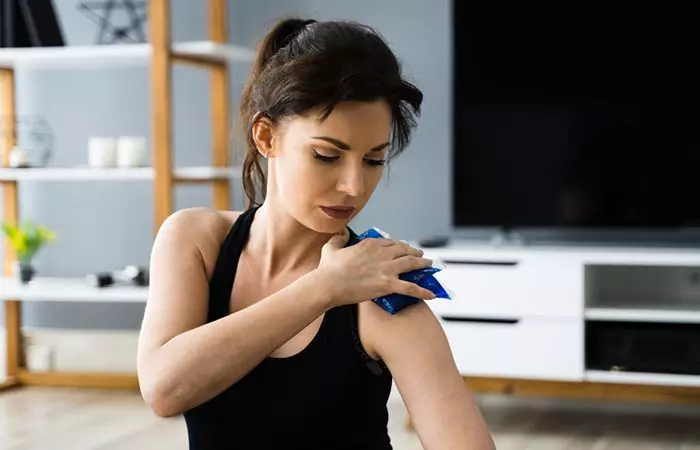
After your shower, if you feel itchy all over, here are a few tips from the American Academy of Dermatology that could help relieve your itching.
- Apply a cold wet cloth or ice pack to the itchy area for 5-10 minutes or till the itch subsides.
- Take an oatmeal bath.
- Apply a moisturizer without fragrance and perfumes.
- Use creams that contain menthol or calaminei Medicated lotion that treats mild itchiness and relieves pain and discomfort caused by minor skin allergies. .
- Use a humidifier in the bathroom to help retain moisture in the air, preventing the skin from drying out or getting itchy after a shower.
You should also try to avoid scratching your skin as this may further irritate it and cause an infection.
Managing the feeling of itching after a shower is more of a temporary fix. Is there a way to prevent this?
How To Prevent Itchy Skin After Shower?

Here are a few ways to try and prevent feeling itchy after shower.
- Apply Moisturizer On Wet Skin
Apply a non-fragrant and non-perfume-based moisturizer on your skin while it is still damp.
This may help lock the moisture on your skin. Use an oil-free moisturizer if you are acne-prone.
K.K. Loke, a blogger, who talks about her chronic neuropathic pain, had developed an itchy skin condition as an adverse reaction to her medications, and nothing seemed to be working on it. Eventually moisturizing worked for her. Noting her surprise, she writes, “I found a very simple and effective solution to my itchy skin: moisturizer! Which I had not needed prior to that point. I hadn’t noticed how dry and wrinkled my skin had become (i)!”
- Consider Switching Your Soap
If you find yourself constantly itchy after showering, it may have something to do with your soap. Should consider changing your soap to a moisturizing soap. Studies suggest that using a moisturizing soap may reduce the symptoms of dry skin that cause itching (6). You can also think about investing in a soap that is fragrance-free, dermatologist-tested, and is formulated with hydrating ingredients like aloe vera, vitamin E, shea butter, glycerin, castor oil, and goat milk.
- Modifying Your Shower Routine
Avoid taking hot water showers more than once a day. Increased frequency and hot water strip the skin of its essential oils and make it dry and itchy. Use cold or lukewarm water to take a shower and keep your bath time short. Ideally, you should spend less than 10 minutes in the shower (7).
- Using Essential Bath Oils
Studies show that using bath oils when taking a shower can help protect the skin’s barrier function and may help in preventing dry skin (8). Make sure you dilute these essential oils with soothing carrier oils like jojoba oil before applying them to your skin. Exercise caution if you have sensitive skin as fragrances can cause irritation.
- Using Anti-itch Creams
Using an anti-itch cream that contains lactic acid may help in relieving itchy skin and retaining its moisture. You can also consider using creams with pramoxine hydrochloride as they may help in preventing itchy dry skin (9).
- Staying Hydrated
Dehydration can cause your skin to dry up and feel itchy. It is important that you drink enough water to stay hydrated and avoid your skin becoming itchy and dry.
Follow these simple steps and you may be able to prevent itchy skin after shower.
In the next section let us understand how cold showers vs hot showers affect your skin.
Cold Shower Vs Hot Shower
Hot showers and cold showers benefit you in their own distinct ways. Whether you prefer a hot shower to a cold shower, it’s really up to you.
- Hot Shower
Hot showers are great after a long hard day of work or after an intense workout. They help relax and soothe the muscles. They help in lowering blood pressure and put you in a relaxed state. Studies show that hot water baths dilate your blood vessels and supply more oxygen and help in relieving stress and anxiety (10).
While a hot bath does have benefits, it also has a few drawbacks when it comes to your skin. A prolonged hot water bath can remove the essential oils and moisture from your skin and cause it to become dry and itchy (4).
- Cold Shower
Cold showers may not be the most pleasurable experience, but they do help improve blood circulation, relieve pain, decrease inflammation, and improve your metabolism (11). Studies also suggest that regular exposure to cold water may have positive effects on skin health and help reduce cortisoli A primary stress hormone produced by the adrenal glands (glands on the kidneys) that acts as our body's natural built-in alarm system. levels (12).
If you are wondering whether you should take a hot shower or a cold shower to help you with itchy skin, the answer is a cold shower.
In the next section let us look at a few tips you can follow if you have sensitive skin.
Amazing Shower Tips For Sensitive Skin
If you have itchy or sensitive skin, here are some tips that may help you.
- Keep your bath times short. Don’t spend more than 10 minutes in the shower. This may help you retain moisture in your skin.
- Avoid using harsh soaps or scented products that contain sodium lauryl sulphate (SLS) as that may irritate your skin.
- Try taking a cold or lukewarm bath as it is better for your skin.
- Avoid using excessive force when drying your skin. Gently pat dry your skin.
- Apply a moisturizer after bath.
There may be times when you end up with uncontrollable itching skin after shower despite good shower practices. In the next section let us look at some home remedies for skin itching that may bring you some relief.
Best Home Remedies To Treat Itching After Shower
- Applying Menthol
A study on pregnant women revealed that the cooling effects of menthol may help in relieving itchy skin (13). Further studies with larger sample sizes need to be conducted to ascertain the effectiveness.
- Using A Cold Pack
Using an ice pack or cold pack may help reduce the inflammation of the skin that may be responsible for causing the itch.
- Using Oatmeal
Studies show that using colloidal oatmeal(oat meat that is finely ground and made especially for baths) may help reduce dryness and itching of the skin (14).
- Using Apple Cider Vinegar
Diluting 1 part apple cider vinegar with 1 part water and applying it to the affected area may help reduce itchiness. Avoid using apple cider vinegar if you have cuts and open wounds as it may cause a painful burning sensation (15).
- Using Aloe Vera
Aloe vera is another popular home remedy for itchy skin. The plant is known for its cooling and anti-inflammatory properties that aid in reducing redness and irritation (16). It also exhibits hydrating effects that help moisturize dry skin, thereby soothing itchiness.
- Using Baking Soda
Anecdotal evidence suggests that using baking soda for itchy skin can be quite effective. While there is no research that can back this claim, it is said to help alleviate minor skin irritation and itchiness. Baking soda has also been often used to soothe skin issues like eczema and tackle frequent flare-ups. It has a gritty texture, which may exfoliate the skin and help prevent breakouts.
If these home remedies help with alleviating your itchy skin, then great. If not, then what is the next course of action? In the next section, let us understand when medical assistance may be required.
When Is It Necessary To Visit A Doctor?
Generally, feeling itchy after shower can be dealt with by following some simple techniques. However, in some cases, excessive itching may be more than just dry skin. Conditions like multiple sclerosisi A chronic, potentially disabling disease that affects the central nervous system (spinal cord and brain). may trigger the nerves in the skin to be overactive and cause itching (17).
Psychogenic pruritus (itching not caused by dermatological, but psychological reasons) which may be a symptom of mental health issues is another possibility. A person dealing with mental health issues such as anxiety, depression, and OCD may have itchy skin (18).
Infographic: Ways To Prevent Itchy Skin After Showers
Itchy skin after a shower is a pretty common issue that you can resolve with simple changes in your skin care routine. From changing your soap to incorporating essential bath oils, there are many ways to prevent itchy skin. We have compiled a list of effective ways to prevent itchy skin after a shower. Check out the infographic below to know more about it.
Some thing wrong with infographic shortcode. please verify shortcode syntaxIt is usual to experience itching after a shower. Fortunately, making small changes to your shower regimen will generally resolve the underlying issues that make you itchy. Many factors can cause it, including a lack of moisture in the skin and harsh chemicals in soaps. Moisturizing your skin and taking lukewarm or cold showers are the easiest ways to avoid this. In addition, there are a few home treatments for itching that you can try. However, you should see a doctor if the itching does not go away after trying home remedies and following care instructions.
Frequently Asked Questions
Why am I so itchy after a cold shower?
A cold shower should remedy itchiness, not cause it. If you feel itchy after a cold shower, you might have cold urticaria, which is a condition in which your skin reacts to the cold within minutes of being exposed to it. There is no cure for this condition, but a doctor can prescribe medical treatment to soothe and manage its severity.
Why do I get a rash every time I shower?
Rashes while showering could be a sign of xerosis, i.e., extremely dry skin. Or, you could have a condition called cholinergic urticaria (19). It manifests when you take a hot shower and your body temperature rises. The nerve fibers in your sweat glands react to the heat and sweat, which causes rashes.
Does vinegar stop itching?
Yes. Scientific evidence shows that vinegar is useful in treating itching skin (20). However, overusing vinegar can cause adverse effects.
Is Vaseline good for itchy skin?
Yes. Vaseline, or petroleum jelly in general, is good for soothing itchy skin (21).
Is coconut oil good for itchy skin?
Yes. Coconut oil can be beneficial in treating itchy skin. It can penetrate deep into the skin to hydrate it and reduce irritation (22).
Ever wondered why your skin gets itchy after a shower? Find out the intriguing reasons in this captivating video. Unravel the mysteries behind post-shower itchiness and explore potential solutions for a soothing bathing experience. Watch now!
Personal Experience: Source
StyleCraze's articles are interwoven with authentic personal narratives that provide depth and resonance to our content. Below are the sources of the personal accounts referenced in this article.
i. 42. Chronic Neuropathic Pain (3): Reactions to Prescribed Pain Killershttps://kits-chronic-pain-management.com/2018/12/16/42-chronic-neuropathic-pain-3-reactions-to-prescribed-pain-killers/
References
Articles on StyleCraze are backed by verified information from peer-reviewed and academic research papers, reputed organizations, research institutions, and medical associations to ensure accuracy and relevance. Read our editorial policy to learn more.
- Spinal Interneuronal Systems: Identification Multifunctional Character and Reconfigurations In Mammals
https://physoc.onlinelibrary.wiley.com/doi/full/10.1111/j.1469-7793.2001.0031b.x - The Effect of Washing and Drying Practices on Skin Barrier Function
https://www.researchgate.net/publication/5651479_The_Effect_of_Washing_and_Drying_Practices_on_Skin_Barrier_Function - Oily Skin: A review of Treatment Options
https://www.ncbi.nlm.nih.gov/labs/pmc/articles/PMC5605215/ - Diagnosis and Treatment of Xerosis Cutis – A Position Paper
https://onlinelibrary.wiley.com/doi/10.1111/ddg.13906 - Aquagenic Pruritus: A Review of the Pathophysiology-Beyond Histamine
https://www.researchgate.net/publication/324721433_Aquagenic_Pruritus_A_Review_of_the_Pathophysiology-Beyond_Histamine - Skin Xerosis. Clinical Report On the Effect of a Moisturizing Soap Bar
https://pubmed.ncbi.nlm.nih.gov/348407/ - Effect of Standardized Skin Care Guidelines on Skin Dryness among Elderly People at Ismailia City
https://www.researchgate.net/publication/330899809_Effect_of_Standardized_Skin_Care_Guidelines_on_Skin_Dryness_among_Elderly_People_at_Ismailia_City - The Effectiveness of Using a Bath Oil to Reduce Signs of Dry Skin: A Randomized Controlled Pragmatic Study
https://www.researchgate.net/publication/309467396_The_effectiveness_of_using_a_bath_oil_to_reduce_signs_of_dry_skin_A_randomized_controlled_pragmatic_study - An Evaluation of The Moisturizing and Anti-Itch Effects of A Lactic Acid and Pramoxine Hydrochloride Cream
https://pubmed.ncbi.nlm.nih.gov/15027519/ - Physical and Mental Effects of Bathing: A Randomized Intervention Study
https://www.researchgate.net/publication/325632685_Physical_and_Mental_Effects_of_Bathing_A_Randomized_Intervention_Study - Human Physiological Responses To Immersion Into Water Of Different Temperatures
https://pubmed.ncbi.nlm.nih.gov/10751106/ - The Effect of Cold Showering on Health and Work: A Randomized Controlled Trial
https://www.researchgate.net/publication/308173495_The_Effect_of_Cold_Showering_on_Health_and_Work_A_Randomized_Controlled_Trial - The Effect of Peppermint Oil on Symptomatic Treatment of Pruritus in Pregnant Women
https://www.ncbi.nlm.nih.gov/labs/pmc/articles/PMC3813175/ - Anti-Inflammatory Activities Of Colloidal Oatmeal (Avena Sativa) Contribute To The Effectiveness Of Oats In Treatment Of Itch Associated With Dry Irritated Skin
https://pubmed.ncbi.nlm.nih.gov/25607907/ - Apple Cider Vinegar Baths
https://journals.lww.com/jdnaonline/Abstract/2018/01000/Apple_Cider_Vinegar_Baths.13.aspx - The Effect of Aloe Vera Clinical Trials on Prevention and Healing of Skin Wound
https://www.ncbi.nlm.nih.gov/pmc/articles/PMC6330525/ - Multiple Sclerosis: Pathogenesis Symptoms Diagnoses and Cell-Based Therapy
https://www.ncbi.nlm.nih.gov/labs/pmc/articles/PMC5241505/ - Skin and Brain: Itch and Psychiatric Disorders
https://pubmed.ncbi.nlm.nih.gov/25854671/ - Diagnosis and Treatment of Urticaria in Primary Care
https://www.researchgate.net/publication/324158729_Diagnosis_and_Treatment_of_Urticaria_in_Primary_Care - Acetic acid and the skin: a review of vinegar in dermatology
https://pubmed.ncbi.nlm.nih.gov/34350993/ - Eczema (Atopic Dermatitis) Treatment
https://www.niaid.nih.gov/diseases-conditions/eczema-treatment - Get the Facts: Coconut Oil
https://nationaleczema.org/blog/get-the-facts-coconut-oil/#:~:text=Coconut%20oil%20has%20the%20natural
Read full bio of Dr. Schwarzburg
Read full bio of Reevan Vishwas Rego
Read full bio of Anjali Sayee
Read full bio of Swathi E






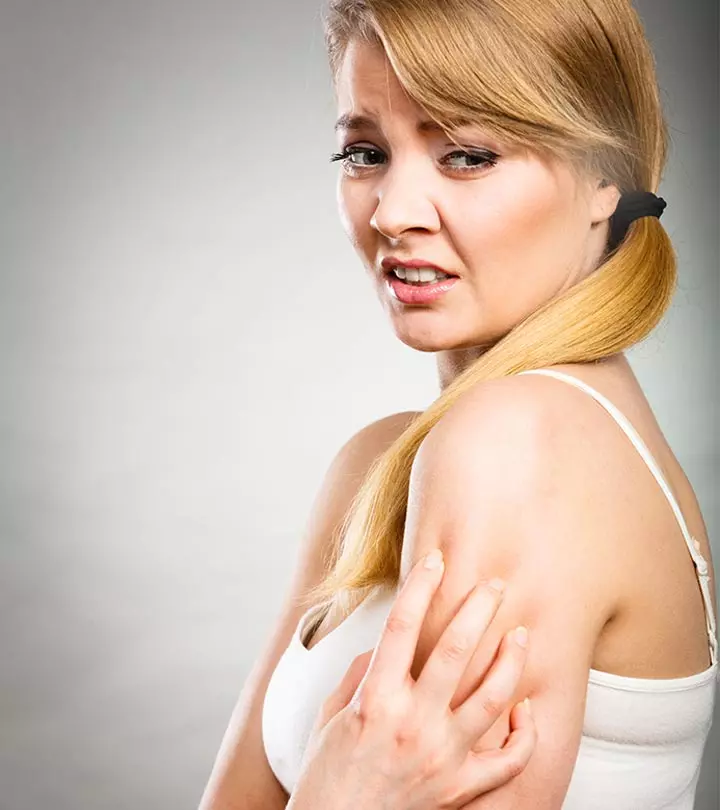



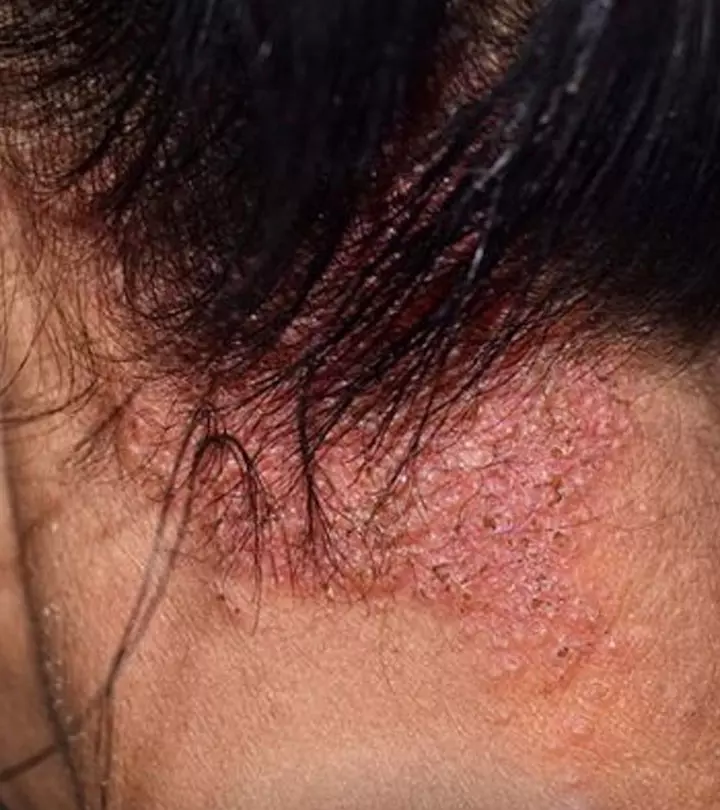

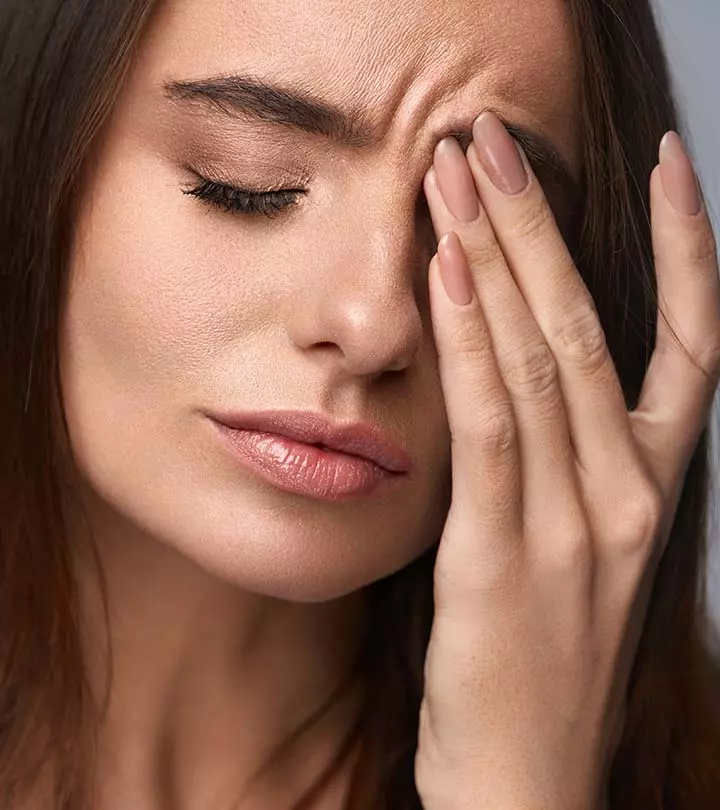

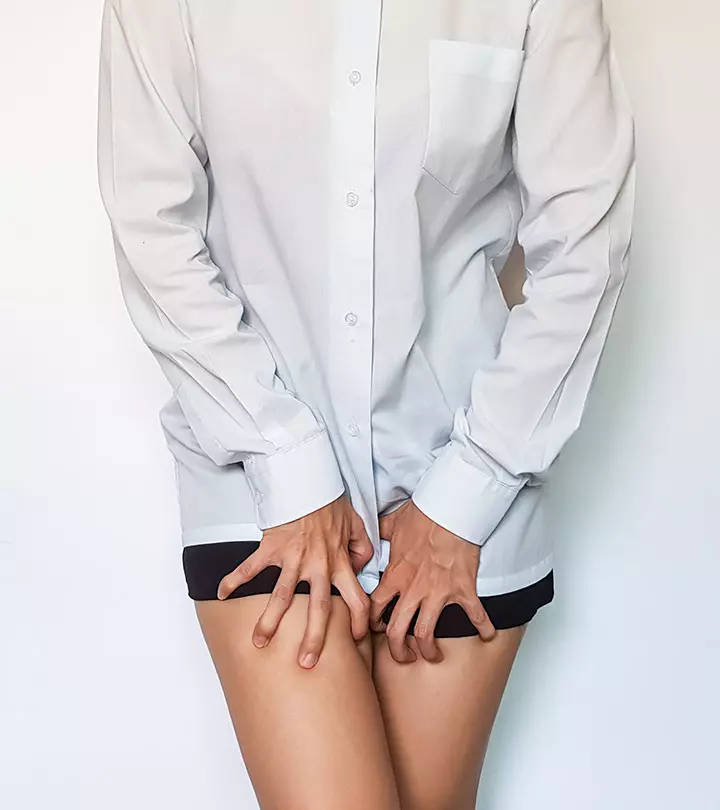

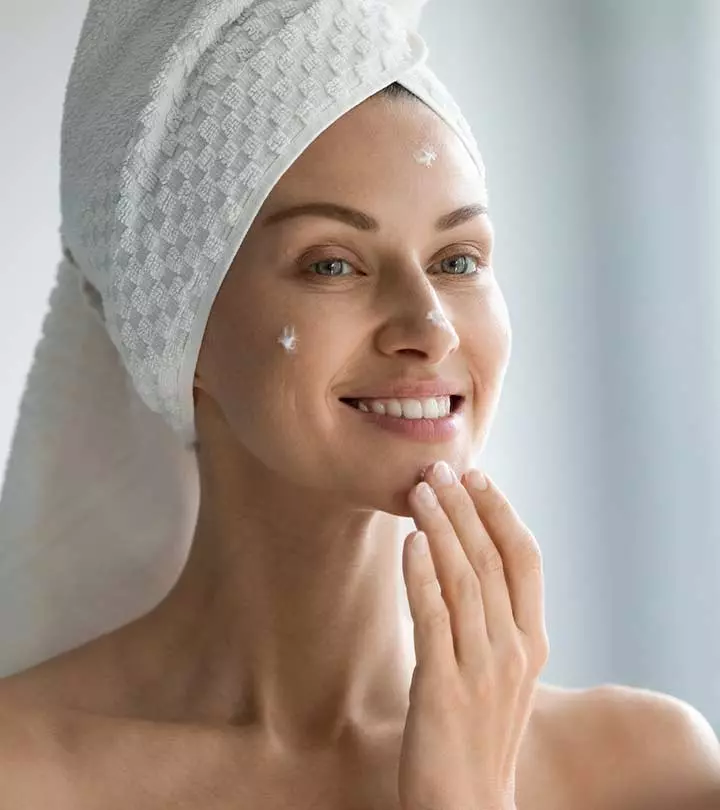
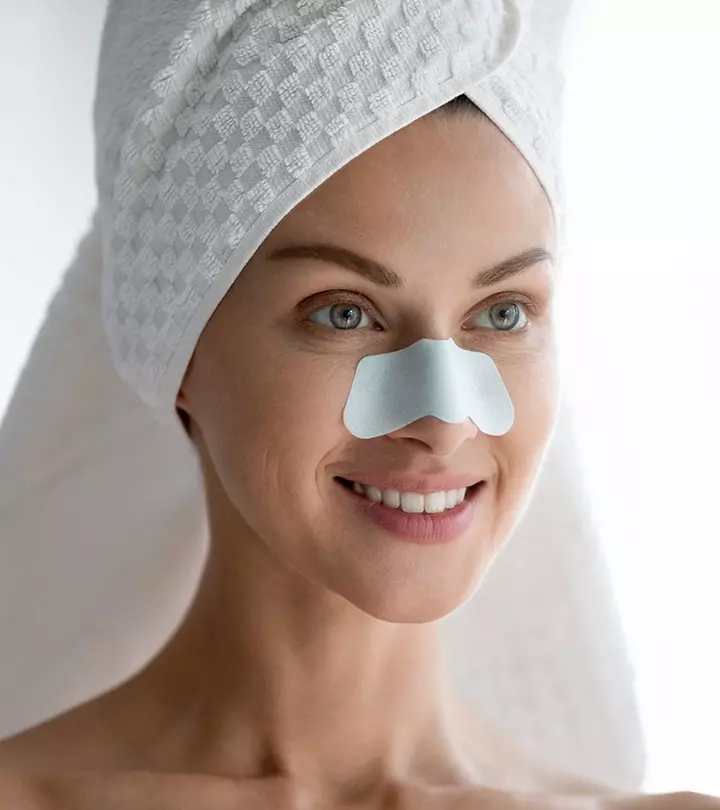
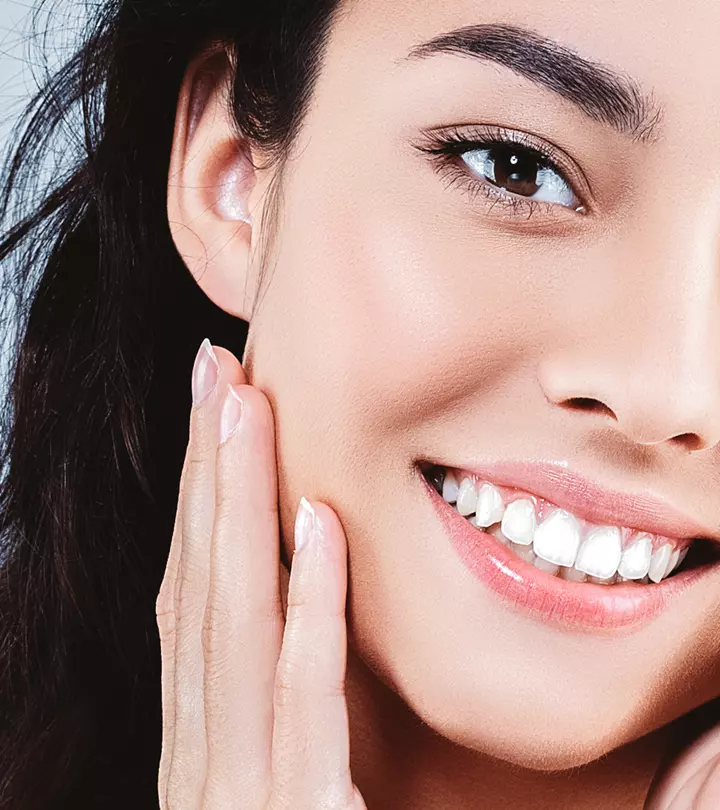


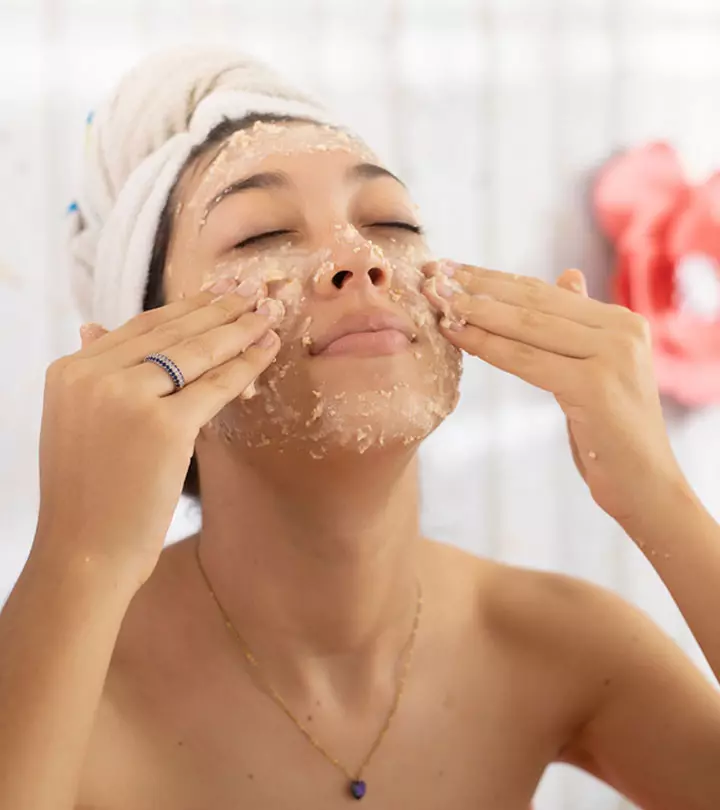
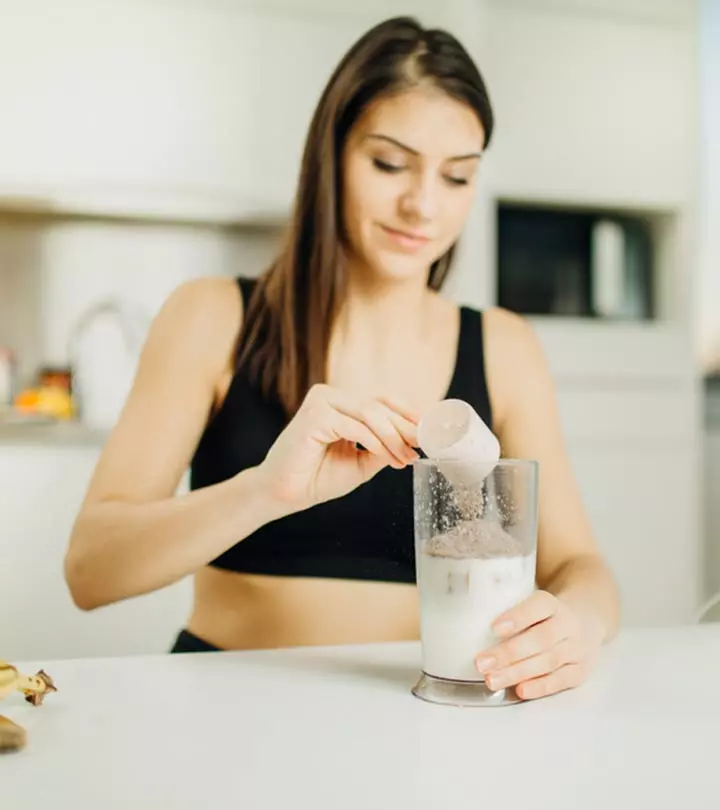
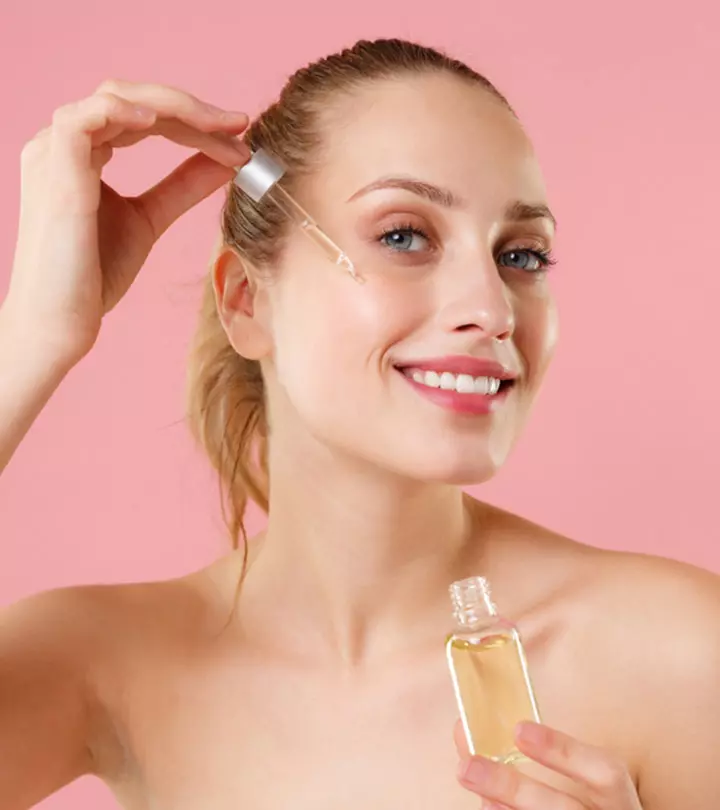


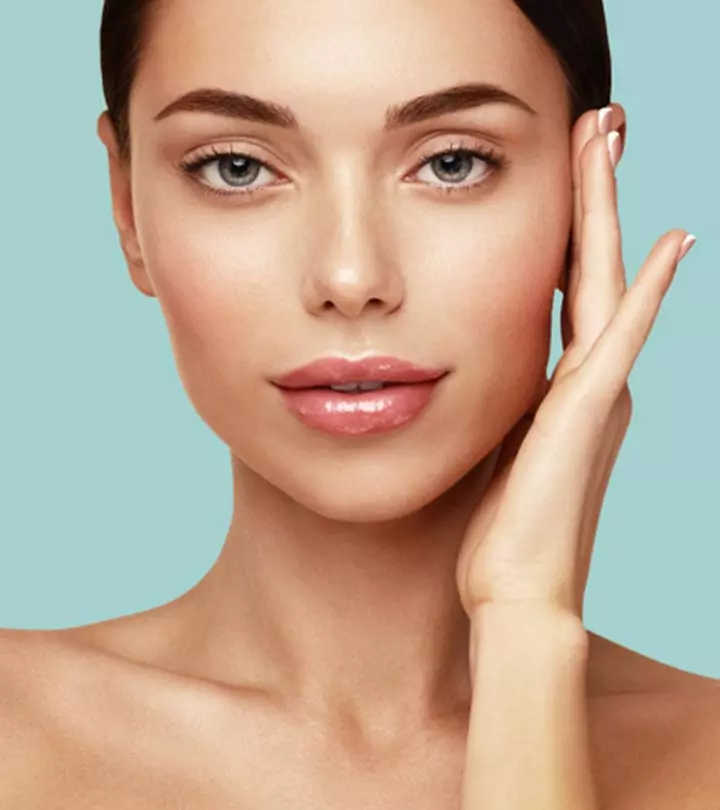
Community Experiences
Join the conversation and become a part of our empowering community! Share your stories, experiences, and insights to connect with other beauty, lifestyle, and health enthusiasts.